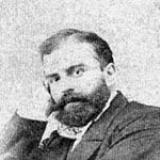
Giovanni Battista Donati
Encyclopedia
Giovanni Battista Donati dʒoˈvanni baˈtista doˈnaːti; 16 December 1826, Pisa
, Italy
– 20 September 1873, Florence, Italy) was an Italian
astronomer
.
Donati graduated from the university of his native city, Pisa
, and afterwards joined the staff of the Observatory
of Florence
in 1852. He was appointed director in 1864.
Donati pioneered spectroscopy
of comets to determine their physical composition, in particular with the comet 1864b, which spectrum he found containing three emitting lines which would four years later be identified by William Huggins
to be carbon
. He discovered that the spectrum changed when a comet approached the Sun
, and that heating caused it to emit its own light rather than reflected sunlight: he concluded that the composition of comets is, at least in part, gaseous. Donati was also a pioneer in the spectroscopic study of the stars and the sun.
Between 1854 and 1864 he discovered six new comet
s, including the spectacular Comet Donati (C/1858 L1), found in 1858.
Donati died from cholera
, which he had contracted while attending a scientific convention in Vienna
.
Pisa
Pisa is a city in Tuscany, Central Italy, on the right bank of the mouth of the River Arno on the Tyrrhenian Sea. It is the capital city of the Province of Pisa...
, Italy
Italy
Italy , officially the Italian Republic languages]] under the European Charter for Regional or Minority Languages. In each of these, Italy's official name is as follows:;;;;;;;;), is a unitary parliamentary republic in South-Central Europe. To the north it borders France, Switzerland, Austria and...
– 20 September 1873, Florence, Italy) was an Italian
Italy
Italy , officially the Italian Republic languages]] under the European Charter for Regional or Minority Languages. In each of these, Italy's official name is as follows:;;;;;;;;), is a unitary parliamentary republic in South-Central Europe. To the north it borders France, Switzerland, Austria and...
astronomer
Astronomer
An astronomer is a scientist who studies celestial bodies such as planets, stars and galaxies.Historically, astronomy was more concerned with the classification and description of phenomena in the sky, while astrophysics attempted to explain these phenomena and the differences between them using...
.
Donati graduated from the university of his native city, Pisa
Pisa
Pisa is a city in Tuscany, Central Italy, on the right bank of the mouth of the River Arno on the Tyrrhenian Sea. It is the capital city of the Province of Pisa...
, and afterwards joined the staff of the Observatory
Observatory
An observatory is a location used for observing terrestrial or celestial events. Astronomy, climatology/meteorology, geology, oceanography and volcanology are examples of disciplines for which observatories have been constructed...
of Florence
Florence
Florence is the capital city of the Italian region of Tuscany and of the province of Florence. It is the most populous city in Tuscany, with approximately 370,000 inhabitants, expanding to over 1.5 million in the metropolitan area....
in 1852. He was appointed director in 1864.
Donati pioneered spectroscopy
Spectroscopy
Spectroscopy is the study of the interaction between matter and radiated energy. Historically, spectroscopy originated through the study of visible light dispersed according to its wavelength, e.g., by a prism. Later the concept was expanded greatly to comprise any interaction with radiative...
of comets to determine their physical composition, in particular with the comet 1864b, which spectrum he found containing three emitting lines which would four years later be identified by William Huggins
William Huggins
Sir William Huggins, OM, KCB, FRS was an English amateur astronomer best known for his pioneering work in astronomical spectroscopy.-Biography:...
to be carbon
Carbon
Carbon is the chemical element with symbol C and atomic number 6. As a member of group 14 on the periodic table, it is nonmetallic and tetravalent—making four electrons available to form covalent chemical bonds...
. He discovered that the spectrum changed when a comet approached the Sun
Sun
The Sun is the star at the center of the Solar System. It is almost perfectly spherical and consists of hot plasma interwoven with magnetic fields...
, and that heating caused it to emit its own light rather than reflected sunlight: he concluded that the composition of comets is, at least in part, gaseous. Donati was also a pioneer in the spectroscopic study of the stars and the sun.
Between 1854 and 1864 he discovered six new comet
Comet
A comet is an icy small Solar System body that, when close enough to the Sun, displays a visible coma and sometimes also a tail. These phenomena are both due to the effects of solar radiation and the solar wind upon the nucleus of the comet...
s, including the spectacular Comet Donati (C/1858 L1), found in 1858.
Donati died from cholera
Cholera
Cholera is an infection of the small intestine that is caused by the bacterium Vibrio cholerae. The main symptoms are profuse watery diarrhea and vomiting. Transmission occurs primarily by drinking or eating water or food that has been contaminated by the diarrhea of an infected person or the feces...
, which he had contracted while attending a scientific convention in Vienna
Vienna
Vienna is the capital and largest city of the Republic of Austria and one of the nine states of Austria. Vienna is Austria's primary city, with a population of about 1.723 million , and is by far the largest city in Austria, as well as its cultural, economic, and political centre...
.

